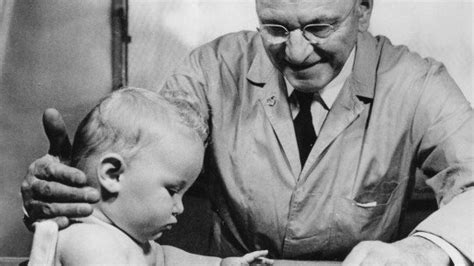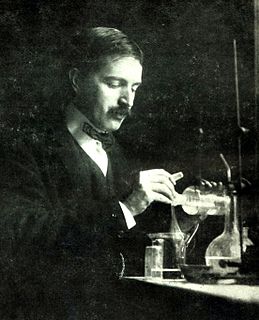A Quote by Jean Piaget
Before playing with his equals, the child is influenced by his parents. He is subjected from his cradle to a multiplicity of regulations, and even before language he becomes conscious of certain obligations.
Related Quotes
At one year of age the child says his first intentional wordhis babbling has a purpose, and this intention is a proof of conscious intelligenceHe becomes ever more aware that language refers to his surroundings, and his wish to master it consciously becomes also greater.Subconsciously and unaided, he strains himself to learn, and this effort makes his success all the more astonishing.
The child's personality is a product of slow gradual growth. His nervous system matures by stages and natural sequences. He sits before he stands; he babbles before he talks; he fabricates before he tells the truth; he draws a circle before he draws a square; he is selfish before he is altruistic; he is dependent on others before he achieves dependence on self. All of his abilities, including his morals, are subject to laws of growth. The task of child care is not to force him into a predetermined pattern but to guide his growth.
Christmas begins what Easter celebrates. The child in the cradle became the king on the cross. And because he did, there are no marks on my record. Just grace. His offer has no fine print. He didn't tell me, "Clean up before you come in." He offered, "Come in, and I'll clean you up." It's not my grip on him that matters but his grip on me. And his grip is sure. So is his presence in my life.
Hollywood keeps before its child audiences a string of glorified young heroes, everyone of whom is an unhesitating and violent Anarchist. His one answer to everything that annoys him or disparages his country or his parents or his young lady or his personal code of manly conduct is to give the offender a "sock" in the jaw.... My observation leads me to believe that it is not the virtuous people who are good at socking jaws.
The tree was so old, and stood there so alone, that his childish heart had been filled with compassion; if no one else on the farm gave it a thought, he would at least do his best to, even though he suspected that his child's words and child's deeds didn't make much difference. It had stood there before he was born, and would be standing there after he was dead, but perhaps, even so, it was pleased that he stroked its bark every time he passed, and sometimes, when he was sure he wasn't observed, even pressed his cheek against it.
Why are we never quite at ease in the presence of a schoolmaster? Because we are conscious that he is not quite at his ease in ours. He is awkward, and out of place in the society of his equals. He comes like Gulliver from among his little people, and he cannot fit the stature of his understanding to yours.
The nephew revenges himself for this, by holding his breath and terrifying his kinswoman with the dread belief that he has made up his mind to burst. Regardless of whispers and shakes, he swells and becomes discoloured, and yet again swells and becomes discoloured, until the aunt can bear it no longer, but leads him out, with no visible neck, and with his eyes going before him like a prawn's.
Depending on the year or the therapist he was seeing, he'd learned to ascribe just about every facet of his character as a psychological reaction to his parents' fighting: his laziness, his overachieving, his tendency to isolate, his tendency to seduce, his hypochondria, his sense of invulnerability, his self-loathing, his narcissism.
I'd once been fascinated by his legend - all the stories I'd heard before I met him. Now I can feel that same sense of fascination returning. I picture his face, so beautiful even after pain and torture and grief, his blue eyes bright and sincere. I'm ashamed to admit that I enjoyed my brief time with him in his prison cell. His voice can make me forget about all the details running through my mind, bringing with it emotions of desire, or fear instead, sometimes even anger, but always triggering something. Something that wasn't there before.
In His discourses, His miracles, His parables, His sufferings, His resurrection, He gradually raises the pedestal of His humanity before the world, but under a cover, until the shaft reaches from the grave to the heavens, whenHe lifts the curtain, and displays the figure of a man on a throne, for the worship of the universe; and clothing His church with His own power, He authorizes it to baptize and to preach remission of sins in His own name.






































